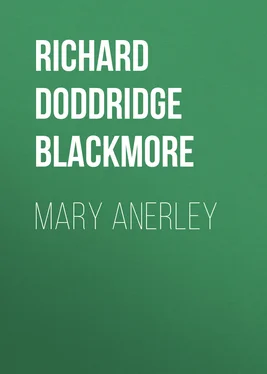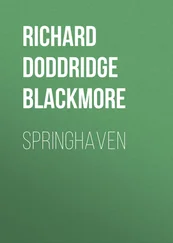Richard Doddridge Blackmore - Mary Anerley
Здесь есть возможность читать онлайн «Richard Doddridge Blackmore - Mary Anerley» — ознакомительный отрывок электронной книги совершенно бесплатно, а после прочтения отрывка купить полную версию. В некоторых случаях можно слушать аудио, скачать через торрент в формате fb2 и присутствует краткое содержание. Жанр: Сказка, literature_19, foreign_antique, foreign_prose, на английском языке. Описание произведения, (предисловие) а так же отзывы посетителей доступны на портале библиотеки ЛибКат.
- Название:Mary Anerley
- Автор:
- Жанр:
- Год:неизвестен
- ISBN:нет данных
- Рейтинг книги:5 / 5. Голосов: 1
-
Избранное:Добавить в избранное
- Отзывы:
-
Ваша оценка:
- 100
- 1
- 2
- 3
- 4
- 5
Mary Anerley: краткое содержание, описание и аннотация
Предлагаем к чтению аннотацию, описание, краткое содержание или предисловие (зависит от того, что написал сам автор книги «Mary Anerley»). Если вы не нашли необходимую информацию о книге — напишите в комментариях, мы постараемся отыскать её.
Mary Anerley — читать онлайн ознакомительный отрывок
Ниже представлен текст книги, разбитый по страницам. Система сохранения места последней прочитанной страницы, позволяет с удобством читать онлайн бесплатно книгу «Mary Anerley», без необходимости каждый раз заново искать на чём Вы остановились. Поставьте закладку, и сможете в любой момент перейти на страницу, на которой закончили чтение.
Интервал:
Закладка:
Upon the roadway of the pier, and over against a mooring-post, where the parapet and the pier itself made a needful turn toward the south, there was an equally needful thing, a gully-hole with an iron trap to carry off the rain that fell, or the spray that broke upon the fabric; and the outlet of this gully was in the face of the masonry outside. Carroway, not being gifted with a crooked mind, had never dreamed that this little gut might conduct the pulses of the air, like the Tyrant’s Ear, and that the trap at the end might be a trap for him. Yet so it was; and by gently raising the movable iron frame at the top, a well-disposed person might hear every word that was spoken in the snug recess below. Cadman was well aware of this little fact, but left his commander to find it out.
The officer, always thinly clad (both through the state of his wardrobe and his dread of effeminate comfort), settled his bony shoulders against the rough stonework, and his heels upon a groyne, and gave his subordinate a nod, which meant, “Make no fuss, but out with it.” Cadman, a short square fellow with crafty eyes, began to do so.
“Captain, I have hit it off at last. Hackerbody put me wrong last time, through the wench he hath a hankering after. This time I got it, and no mistake, as right as if the villain lay asleep ‘twixt you and me, and told us all about it with his tongue out; and a good thing for men of large families like me.”
“All that I have heard such a number of times,” his commander answered, crustily, “that I whistle, as we used to do in a dead calm, Cadman. An old salt like you knows how little comes of that.”
“There I don’t quite agree with your honor. I have known a hurricane come from whistling. But this time there is no woman about it, and the penny have come down straightforrard. New moon Tuesday next, and Monday we slips first into that snug little cave. He hath a’ had his last good run.”
“How much is coming this time, Cadman? I am sick and tired of those three caves. It is all old woman’s talk of caves, while they are running south, upon the open beach.”
“Captain, it is a big venture—the biggest of all the summer, I do believe. Two thousand pounds, if there is a penny, in it. The schooner, and the lugger, and the ketch, all to once, of purpose to send us scattering. But your honor knows what we be after most. No woman in it this time, Sir. The murder has been of the women, all along. When there is no woman, I can see my way. We have got the right pig by the ear this time.”
“John Cadman, your manner of speech is rude. You forget that your commanding officer has a wife and family, three-quarters of which are female. You will give me your information without any rude observations as to sex, of which you, as a married man, should be ashamed. A man and his wife are one flesh, Cadman, and therefore you are a woman yourself, and must labor not to disgrace yourself. Now don’t look amazed, but consider these things. If you had not been in a flurry, like a woman, you would not have spoiled my dinner so. I will meet you at the outlook at six o’clock. I have business on hand of importance.”
With these words Carroway hastened home, leaving Cadman to mutter his wrath, and then to growl it, when his officer was out of ear-shot.
“Never a day, nor an hour a’most, without he insulteth of me. A woman, indeed! Well, his wife may be a man, but what call hath he to speak of mine so? John Cadman a woman, and one flesh with his wife! Pretty news that would be for my missus!”
CHAPTER XIV
SERIOUS CHARGES
“Stephen, if it was anybody else, you would listen to me in a moment,” said Mrs. Anerley to her lord, a few days after that little interview in the Bempton Lane; “for instance, if it was poor Willie, how long would you be in believing it? But because it is Mary, you say ‘pooh! pooh!’ And I may as well talk to the old cracked churn.”
“First time of all my born days,” the farmer answered, with a pleasant smile, “that ever I was resembled to a churn. But a man’s wife ought to know best about un.”
“Stephen, it is not the churn—I mean you; and you never should attempt to ride off in that sort of way. I tell you Mary hath a mischief on her mind; and you never ought to bring up old churns to me. As long as I can carry almost anything in mind, I have been considered to be full of common-sense. And what should I use it upon, Captain Anerley, without it was my own daughter?”
The farmer was always conquered when she called him “Captain Anerley.” He took it to point at him as a pretender, a coxcomb fond of titles, a would-be officer who took good care to hold aloof from fighting. And he knew in his heart that he loved to be called “Captain Anerley” by every one who meant it.
“My dear,” he said, in a tone of submission, and with a look that grieved her, “the knowledge of such things is with you. I can not enter into young maids’ minds, any more than command a company.”
“Stephen, you could do both, if you chose, better than ten of eleven who do it. For, Stephen, you have a very tender mind, and are not at all like a churn, my dear. That was my manner of speech, you ought to know, because from my youngest days I had a crowd of imagination. You remember that, Stephen, don’t you?”
“I remember, Sophy, that in the old time you never resembled me to a churn, let alone a cracked one. You used to christen me a pillar, and a tree, and a rock, and a polished corner; but there, what’s the odds, when a man has done his duty? The names of him makes no difference.”
“‘Twist you and me, my dear,” she said, “nothing can make any difference. We know one another too well for that. You are all that I ever used to call you, before I knew better about you, and when I used to dwell upon your hair and your smile. You know what I used to say of them, now, Stephen?”
“Most complimentary—highly complimentary! Another young woman brought me word of it, and it made me stick firm when my mind was doubtful.”
“And glad you ought to be that you did stick firm. And you have the Lord to thank for it, as well as your own sense. But no time to talk of our old times now. They are coming up again, with those younkers, I’m afraid. Willie is like a Church; and Jack—no chance of him getting the chance of it; but Mary, your darling of the lot, our Mary—her mind is unsettled, and a worry coming over her; the same as with me when I saw you first.”
“It is the Lord that directs those things,” the farmer answered, steadfastly; “and Mary hath the sense of her mother, I believe. That it is maketh me so fond on her. If the young maid hath taken a fancy, it will pass, without a bit of substance to settle on. Why, how many fancies had you, Sophy, before you had the good luck to clap eyes on me?”
“That is neither here nor there,” his wife replied, audaciously; “how many times have you asked such questions, which are no concern of yours? You could not expect me, before ever I saw you, not to have any eyes or ears. I had plenty to say for myself; and I was not plain; and I acted accordingly.”
Master Anerley thought about this, because he had heard it and thought of it many times before. He hated to think about anything new, having never known any good come of it; and his thoughts would rather flow than fly, even in the fugitive brevity of youth. And now, in his settled way, his practice was to tread thought deeper into thought, as a man in deep snow keeps the track of his own boots, or as a child writes ink on pencil in his earliest copy-books. “You acted according,” he said; “and Mary might act according to you, mother.”
“How can you talk so, Stephen? That would be a different thing altogether. Young girls are not a bit like what they used to be in my time. No steadiness, no diligence, no duty to their parents. Gadding about is all they think of, and light-headed chatter, and saucy ribbons.”
Читать дальшеИнтервал:
Закладка:
Похожие книги на «Mary Anerley»
Представляем Вашему вниманию похожие книги на «Mary Anerley» списком для выбора. Мы отобрали схожую по названию и смыслу литературу в надежде предоставить читателям больше вариантов отыскать новые, интересные, ещё непрочитанные произведения.
Обсуждение, отзывы о книге «Mary Anerley» и просто собственные мнения читателей. Оставьте ваши комментарии, напишите, что Вы думаете о произведении, его смысле или главных героях. Укажите что конкретно понравилось, а что нет, и почему Вы так считаете.












